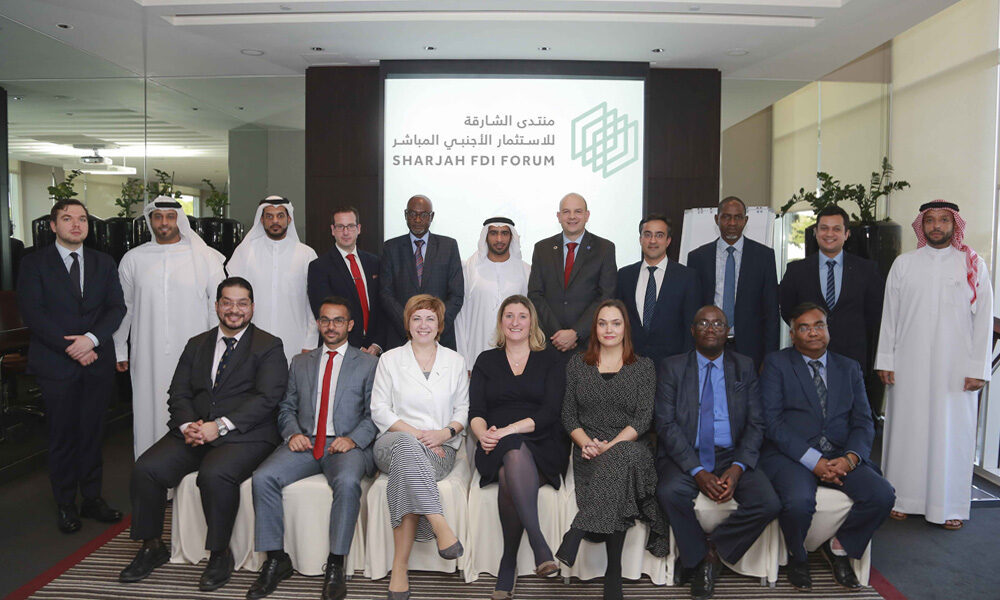Business & Money
The WAIPA Workshop Integrates and Innovates Solutions with Leading Experts
Invest in Sharjah organized the workshop in collaboration with WAIPA with the aim to boost competitiveness regionally

A pre-conference foreign direct investment (FDI) workshop was held yesterday in Sharjah, on ‘Integrating innovative solutions to boost competitiveness’, as part of the fourth edition of Sharjah FDI Forum under the theme, “Shaping the Future of Economies”, which kicks off today at Al Jawaher Reception and Convention Centre (JRCC).
The workshop was organized by Sharjah FDI Office (Invest in Sharjah) in collaboration with the World Association of Investment Promotion Agencies (WAIPA) to enable participants to learn from marketing and investment promotion specialists as well as representatives of leading investment promotion agencies.
The workshop presenters included David East, Head of FDI & Economic Products from Bureau van Dijk – a Moody’s Analytics Company; Syed Husain Quadri, Acting Director – Country Strategy and Cooperation Department from Islamic Development Bank; Sabrina Heinekey, Director of International Business from M&C Saatchi; Mohit Bhasin, Partner and Country Lead, Economic Development Solution and Ramendra Verma, Partner and Head of Government Advisory from KPMG India.
Mohamed Al Musharrkh, CEO of Invest in Sharjah and Bostjan Skalar, Executive Director of WAIPA opened the session with immense gratitude toward the respective institutions and their dedication to continually transform and guide foreign investors through expert advice in the midst of turbulent and fruitful times.
Data is Knowledge
David East conducted the first workshop session titled, “Global FDI Trends and Using FDI Data,” which ventured into the uncertain investment climate as global FDI is down by 23% since 2017. The value of Greenfield projects in the MENA region has decreased by 22% but the number is growing by 21%, on the flip side, the value of M&A transactions into the MENA region is up by 16%, but the number of transactions has decreased by the same percentage. The overall climate shows fragile growth, however East expounded that by using the right FDI data, companies can harness product, market, competitor, and investor intelligence in their decision-making process.
“The growth industries in the MENA region are transport and food manufacturing, computer software, utilities, and industrial, electric, and electronic machinery. Several business functions such as electricity, data centers, education and training centers, R&D, logistics, distribution, and transportation are gaining prominence as well. Knowledge comes from data which allows understanding of region’s prospects and strategies,” shared East in his data-driven presentation.
Investment is crucial for economic growth and development
“As we are in the midst of the fourth industrial revolution where the whole world trade system is under assault, each of us have to play our part in a harmonized approach and rely on international good practices, but find localized solutions that works for us,” explained Syed Husain Quadri.
His session was titled, “How to improve the investment climate and competitiveness in the promotion and attraction of FDI” where he illustrated that there is no one-size fits all approach. The opportunity lies in integrating emerging market countries into global markets’ value chains. For instance, specializations in automotive chemicals unlocks a $57.6 billion global market.
Simplicity of Thought is a Painful Necessity
Sabrina Heinekey illustrated the power of brand in her session titled, “Destination Branding, Insights to Create Added Value.” She presented the core elements of destination branding which includes vision, proposition, positioning, values, attributes, and key messages.
“A successful destination brand must be embraced by citizens, residents, government stakeholders, domestic, and international business. The brand promise must reflect the experience, every interaction with the country should exemplify the brand promise,” remarked Sabrina.
Importance of Ecosystem Development at a Local Level
In the last session, Mohit Bhasin and Ramendra Verma from KPMG engaged the audience in a workshop titled, “Account Management and Managing Investment Lifecycle.” They explained that for business to survive nowadays, a different strategy needs to be implemented. Traditionally, when there is capital, the enterprise establishes the ecosystem for their investment to flourish. However, that’s not possible in such conflicting times.
“We don’t look at investment promotion in isolation, but we look at it as an ecosystem where skills, start-ups, manufacturing, and raw material supply chain are important. If the investment is entrenched in the local population, the stickiness of the investment will remain regardless of political situations,” explained Bhasin. The session ended with a robust Q&A session on the best practices example by the Government of Maharashtra, India.
Over 1000 elite business leaders and economists from the public and private sectors will gather for the first day of the fourth edition of Sharjah FDI Forum, taking part across 12 panel sessions and 13 side sessions during the two-day forum, which concludes tomorrow (Tuesday) December 11th.